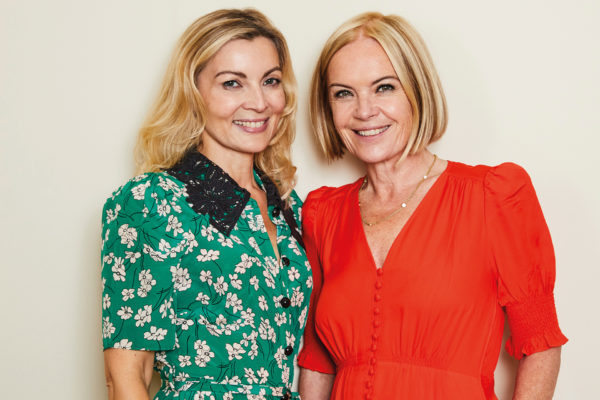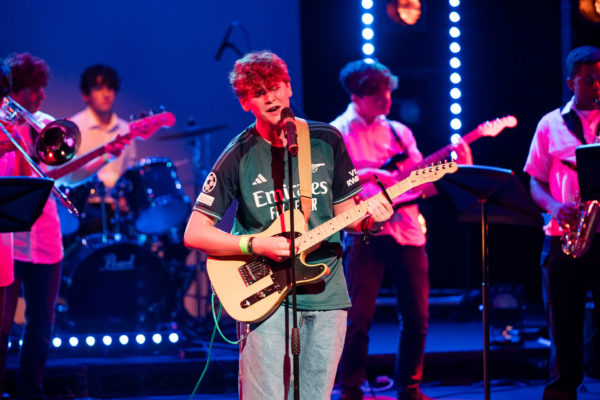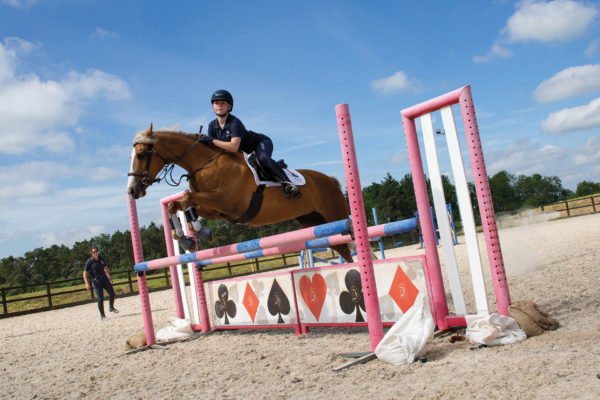Why Are Expeditions Important For Students?
By
2 years ago
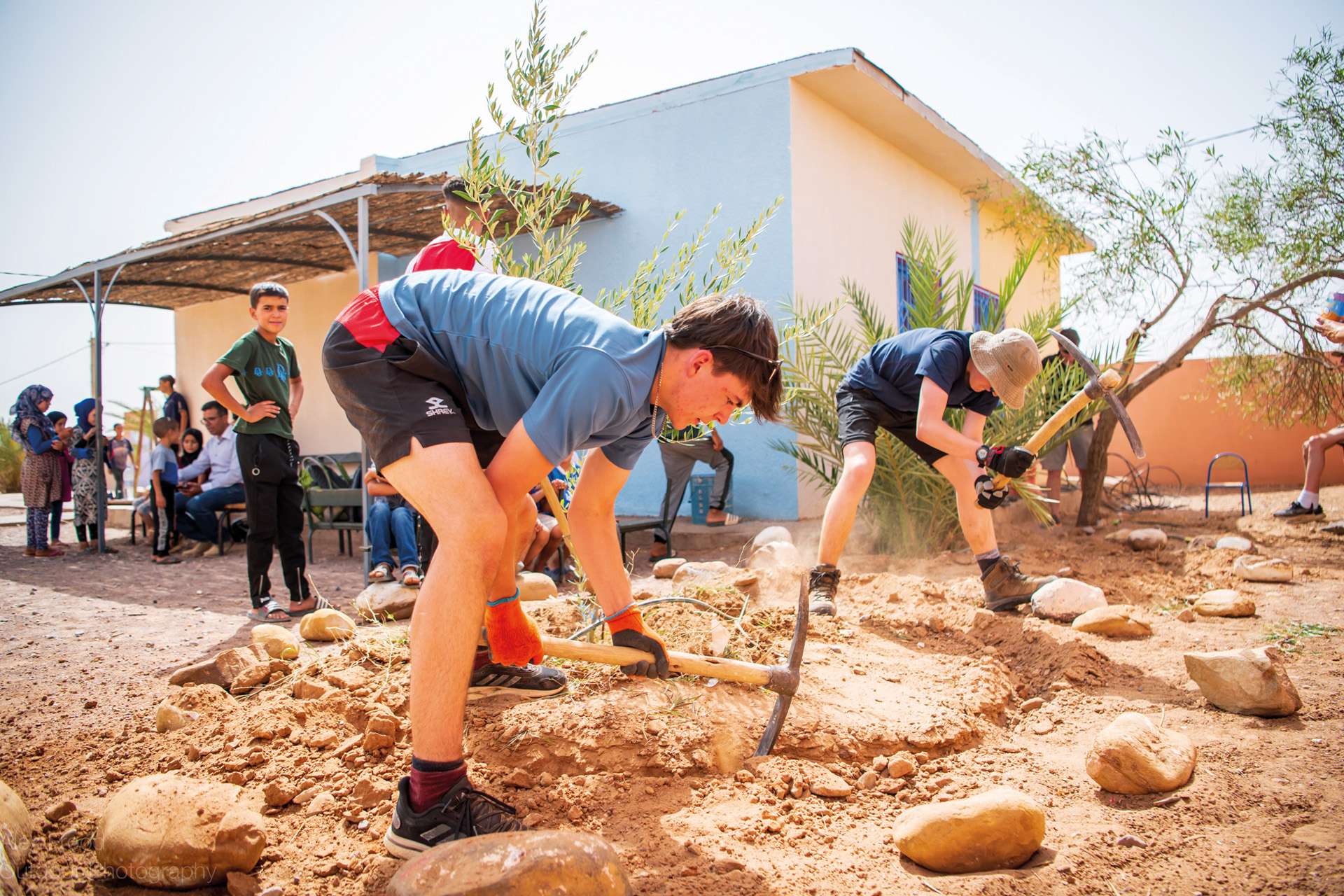
A new enthusiasm for expeditions has emerged post-Lockdown – and the benefits are both physical and mental, says Thea Jourdan
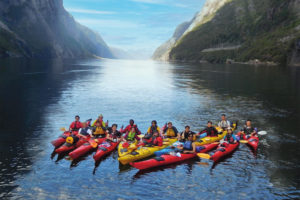
Charterhouse pupils kayaking in Norway on their DoE expedition
Young people need wilderness and adventure in their lives to help them develop into well-rounded young adults. Not surprisingly, expeditions run by schools, charities and private companies continue to inspire thousands of children to develop their potential, connect to nature and test themselves morally and physically. Since the end of Covid lockdowns, many schools have restarted expeditions, many of them to the wilder places in the UK, and some further afield.
And not a moment too soon, says Simon Young, head of outdoor education at Cranleigh School, a co-educational day and boarding school set in nearly 300 acres of leafy Surrey.
‘We are finally settling back to normal again after Covid, and apart from the experience and time having fun with friends, the main thing the pupils learn on expeditions is how to look after themselves,’ Young explains. ‘So much is done for them in their normal lives that it is really important for them to be placed in a managed situation when the mistakes they make have consequences.’
Like many independent schools, lots of Cranleigh’s expeditions are geared towards attaining the bronze, silver and gold Duke of Edinburgh (DoE) awards. At any one time, about half a million young people are taking part in the awards in more than 130 countries and territories, not just all four countries in the UK.
As well as volunteering and becoming ‘active citizens’, to achieve an award, young people are encouraged to take part in expeditions, lasting two days and one night in the case of bronze, three days and two nights for the silver and a minimum of four days, and three nights with eight hours planned activity each day, for the prestigious gold. An alternative to DoE is the Combined Cadet Force (CCF), which celebrates its 75th anniversary this year, offers young people a broad range of challenging, exciting, adventurous and educational activities with a military bent.
Each CCF is an educational partnership between an individual school and the Ministry of Defence. More than 500 senior schools all over the UK, including many private schools, take part.
In March this year, my son, Hugo, a Year 10 pupil at Cranleigh School, spent his first CCF camp at Crowborough Cadet Training Camp where he enjoyed eating excellent Gurkha curry from the military chefs, while taking part in activities which included first aid, night navigation, night movement and Close Target Reconnaissance.
Despite the managed risks, safety is right at the top of the agenda when it comes to expeditions for school-age children. Although mobile phones are usually not allowed, many children now get issued GPS trackers when they head off to the hills in small groups. Dr John Warren, the director of outdoor education at Charterhouse School in Godalming, Surrey, and Officer in Command of the Royal Marines detachment of the CCF, says that GPS trackers are issued as a matter of routine. ‘I think if we have the technology to track their progress, we should use it. It’s all about risk management.’
Preparation is also key as children start expeditions again. ‘This year we introduced the bronze award for the first time for Year 9 and all 182 children took part,’ says Dr Warren. ‘After a long hiatus there is definitely an appetite for it. The bronze award is great and teaches them how to be self sufficient and that it’s fine to get things wrong as long as you retrace your steps and try again.’ Older children get a chance to take part in the school’s Endurance Challenge, a bracing 50-mile walk that needs to be covered in less than 24 hours. ‘They don’t always look forward to walking, camping and spending time away from their mobile phones but at the end of it, they almost always say when is the next one?’ says Dr Warren.
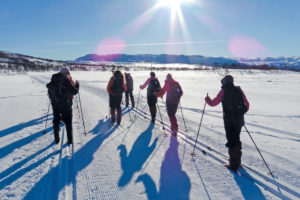
Canford School CCF Cross Country Skiing in Norway
Some schools have a distinct advantage when it comes to offering expeditions right on their doorstep. Rob Hoey, Head of Adventure at Canford School, explains: ‘We’re blessed to be based in south Dorset with Poole Harbour, the Purbecks and the New Forest, amazing heathland and the Jurassic Coast.’
The school is on the River Stour so there are plenty of opportunities for canoeing and rowing. ‘Slightly further afield, we run camping trips in the Purbecks, use Bovington and Lulworth for CCF (Cadets) exercises, and are overhauling our watersports programme to make better use of our proximity to Poole Harbour and the interests of our pupils, many of whom sail, windsurf, paddleboard or swim.’
The school’s main DoE focus is the gold award in the sixth form and between 30 to 40 sign up for gold each year, (around 25 percent of a year group). ‘While there are so many benefits to a four-day gold walking expedition, we do encourage pupils to think outside the box and take advantage of the wider expedition options available,’ says Rob Hoey. ‘This year we have a number doing a sailing expedition, and last summer an enterprising group did the Inverpolly Canoe Trail, an epic route through the wilderness of the Cairngorms, linking rivers and lakes in a truly wild and memorable journey.’
Another school to make the most of its location is Truro School. ‘Being in Cornwall, our children have a rare opportunity to experience their educational journey ‘in real life’, rather than through digital platforms,’ says Zoe Jobling, Truro School Deputy Head (Partnerships and Co-curricular). ‘We have access to some of the UK’s best natural environments, from beaches and geographical formations to moorland, mining, farming and other outdoor pursuits and industries.’
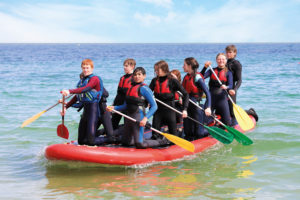
Truro School pupils participate in watersports
Truro School has an enviable reputation in the Ten Tors Event and pupils start preparing for the event in May in locations closer to home, including the South West Coastal Path, Bodmin Moor and Dartmoor.
Two years on from Covid lockdowns, the demand for expeditions and outdoor adventure is higher than ever, despite rising costs and the cost of living crisis, says Zoe Jobling. ‘The uptake of the school’s clubs, trips and experiences is strong and we have looked to increase our provision in certain offerings, like our bronze Duke of Edinburgh. This may be a consequence of the pandemic; a renewed vigour to live life to the fullest. Or perhaps it is a side-effect of our time in lockdown, where we were so heavily reliant on our natural world as a source of exercise, relaxation and well-being.’
Canford has a large and thriving CCF of some 280 cadets, split across Army, Royal Navy and Royal Marines detachments. Cadets can take part in the Ten Tors, when teams of six navigate their way across Dartmoor’s demanding terrain between 10 checkpoints. ‘With 2,400 young people taking part, and full support from the military who organise it, it is quite an occasion,’ says Hoey.
While many schools run expeditions themselves, dedicated private companies can provide packages that allow for complex schedules in difficult terrain. Go Adventure is a global company that organises adventure trips for young people including school pupils, army personnel and individuals. Its Hardangervidda & Heroes of Telemark Extended Tour in Norway includes spending a night in a snow hole, cross country skiing while learning avalanche awareness training. It’s a popular option for schools and has now been running for many years. Depending on numbers taking part, a trip like this can cost around £2,000 per person.
Local expeditions have the advantage of being much more affordable and may not even involve extra cost at all. Active, which offers adventure education trips for schools in the Cairngorms National Park, offers five-day, four-night residential stays for £329, not including VAT, which includes everything except travel to and from the centre.
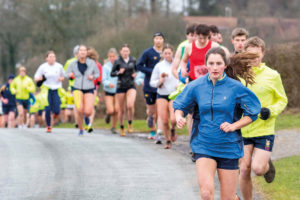
Sedburgh’s annual Wilson Run, with 200 sixth formers taking part
Few schools are as well known for their outdoor activities and adventurous spirit as Sedbergh School in the Lake District. Nestled at the foot of the Howgill Fells, the co-educational boarding school is renowned for creating champion sports stars and hardy adventurers. Typical outdoor activities on offer include caving, fell running, mountain biking, kayaking, rock climbing, mountaineering, and gill scrambling (a wetsuit-clad scramble up a steep river). The yearly 12-mile Wilson Run, which has been called the ‘longest and toughest school run’, is a rite of passage for sixth form pupils.
Gwyneth Parry, Director of Adventure Activities and DoE gold expeditions lead, says Sedbergh has ‘a very proud, lively tradition of expeditions’.
She says: ‘Our youngest pupils learn the skills required for safe travel and camping in wild country through weekly sessions culminating in a summer expedition where they walk out of the school gates into the hills, camp, and return a different way without the use of any form of transport other than their legs. Our older pupils are regularly given the opportunity to undertake expeditions to an exciting variety of locations: recently we have been to Ladakh, Madagascar and Bolivia.’
The school also has a thriving DoE Award Scheme, with a high uptake for both silver and gold. ‘We currently have 50 sixth formers undertaking the gold award. Our gold expeditions have taken place on foot, on horseback, on mountain-bikes, in canoes and under sail.’
She believes expeditions allow young people the freedom from the pressures of busy modern life to discover and express themselves. ‘It encourages them to work empathetically with others, to push themselves beyond what they believe to be their limits, to surprise themselves, and to feel the beneficial influence of the natural world. Expeditions promote our community’s collective goals of Humility, Ambition, Resilience and Kindness; they are what we are all about!’
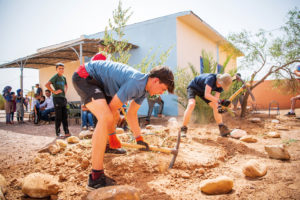
Blundells School on their expedition to Morocco
It’s a sentiment shared by Barry Dawe, head of outdoor pursuits at Blundell’s School, a co-educational boarding school in Devon, ‘Our outdoor expeditions are important to us as they develop our pupil’s resilience, teamwork, confidence and knowledge of the environment.’
Many expeditions take place nearby Dartmoor and Exmoor, where year 7 and 8 pupils undertake an overnight expedition, which is called ’The Journey’. Pupils prepare for their bronze, silver and gold DoE awards here, as well as Brecon and the Lake District, and they are run by the school’s own trained staff.
The School’s World Challenge Expedition, which takes place every two years, is a more formidable undertaking. Last year, pupils headed to Morocco where they divided their time between taking part in a community project on the edge of the Sahara Desert, helping to renovate the grounds of a local school in one of the poorest parts of Morocco, trekking though the Atlas Mountains and finally rest and recuperation in Marrakech.
All agree that pupils who go on expeditions while at school grow up to be adventurous independent adults with a broad view of life’s many opportunities. Simon Young, who has led trips to the Indian Himalayas, China, Greenland and the Atlas mountain of Morocco, says he takes ‘huge pride’ in seeing the pupils develop and become independent adventurers, leaving school, equipped with the necessary skills to go it alone. ‘I get a great thrill from random postcards and emails from former pupils telling me what they are up to and where they have been.’




